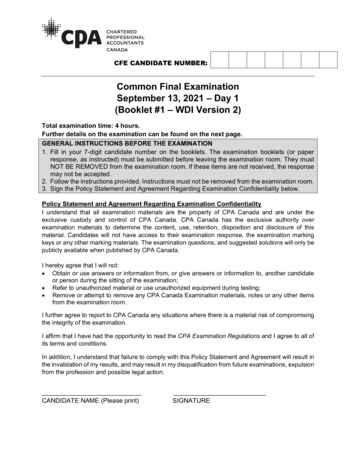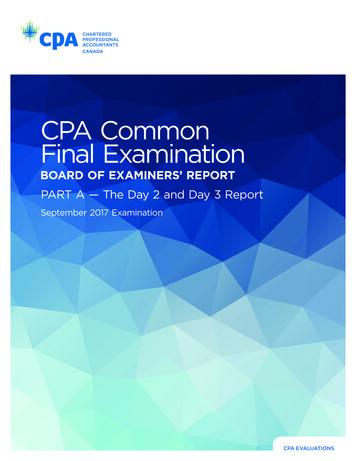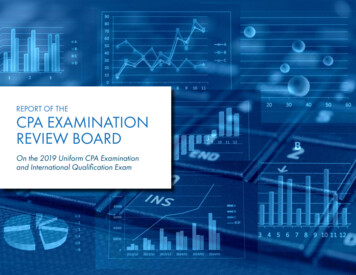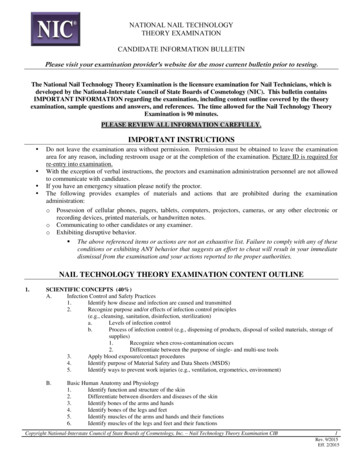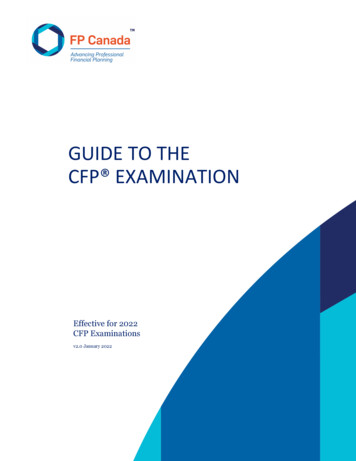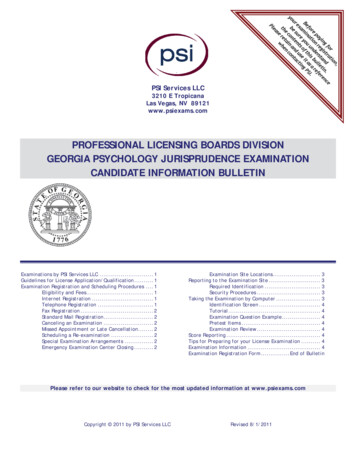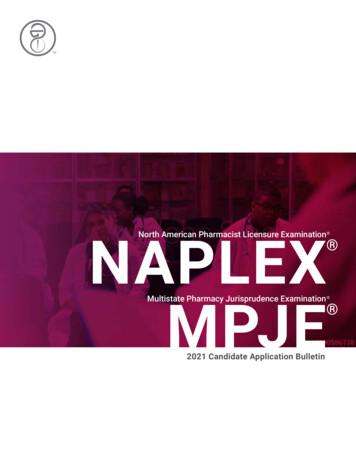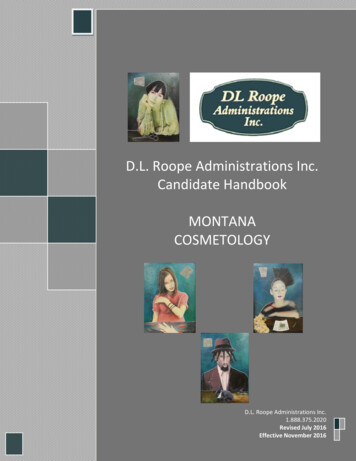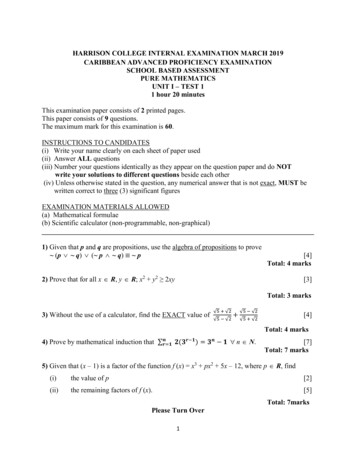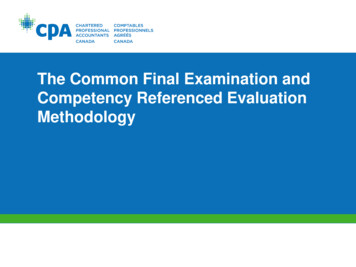
Transcription
The Common Final Examination andCompetency Referenced EvaluationMethodology
Information PackageI.Overview and BackgroundII.The Evaluation Process Day 1III.The Evaluation Process Day 2 and 3
The CPA Program
The FoundationThe EntryEntry-level-level CPAThe “Ground Rules” for Evaluation A business professionalSix technical competency areas: Possessing broadcompetency Governance and Strategy Finance Taxation Audit and Assurance Financial Reporting and Management Accounting Possesses enabling skillsThe CPA Competency Mapprovides an overview ofthe enabling competenciesthat CPA candidates areexpected to demonstrateon the profession’sCommon Final Evaluation(CFE).There are competencyarea coverage (breadthand depth tests)requirements to be met.
The CPA Competency Map and KnowledgeSupplementThe foundationfor the CFEblueprint
Evaluating Responses to IndividualSimulationsThe BOE needs to consider whether the situation being presented to thecandidate in the simulation is “routine vs non-routine” and whether it is“complex or non-complex”.In routine, non-complex situations the candidate is expected to be able toperform at a higher level than in an non-routine, complex situation.Generally, highly-complex non-routine situations are NOT testable.[Appendix A of the CPA Competency Map provides examples.]
The CFE assesses the highest level of skillallowed by Map .
The new CPA CFECompetency based assessment; each day of the CFE does something very unique:1.Day 1 is evaluated separately from Day 2 and 3. It is “linked” to the Capstone 1group case work. It assesses the decision making/ professional skills.Assessment is at a “high-level”.2.Day 2 is the DEPTH test. It assesses technical DEPTH in one of 4 unique roles(that reflect the four CPA Electives) and provides DEPTH opportunities incommon core - Financial Reporting and/or Management Accounting.Candidates choose 1 role.3.Day 3 supplements the DEPTH test in common core Financial Reporting and/orManagement Accounting and is the BREADTH test for all common corecompetency areas.
Day 1 (cont’d) Day 1 is a 4 hour caseCase targets “board room and senior management” level of discussion i.e. not expected to get into the details (which will be addressed later by theoperational teams)Candidates told not to do the detailed analysis. Day 2 and 3 assess the technical competenciesDay 1 is “linked”/related to the Capstone 1 case, which is worked on in groupsfor 8 weeksCandidates allowed to access their Capstone 1 case (not their group’s answer,and not the sample response)Candidates encouraged to limit their responses to 5,000 words, but there is noimposed limit
Day 1BASIC PREMISE: Day 1 is a holistic assessment - Pass or Fail only. Havingpassed Capstone 1, there is a presumption that candidates are able to respondto the linked case. The assessment is looking for “fatal flaw” weaknesses intheir responses. Assessment focuses on the enabling competencies NOT the technicalcompetencies (e.g. broad thinking, decision-making skills, integration,professional judgement, ability to provide useful advice, etc.)Assessment also looks at “links” to Capstone 1 (i.e., did they reallyunderstand the key success factors, mission, vision, objectives of thebusiness?) What do they draw upon from Cap 1?Can think on their feet and adjust to the changes in the case? I.e., If we“twist” the scenario/ provide new issues to deal with what do they do?The assessment reflects the CPA Way and its main components (see nextslide)
Evaluating Responses to IndividualSimulations - Day 1
The new CPA CFE - Day 21.A four hour case, but candidates are given five hours to respond to allow time tofilter /find the information that they need to answer their requireds2.Candidates have pre-selected a role (Finance or Tax or Assurance or Perf.Management); all get the same case –a common section and four sets ofappendices containing additional information applicable to each role3.Excel sheet in candidates response file will be “preloaded” with financialstatements from the case (balance sheet and income statement only)4.All “Requireds” are VERY directed5.DEPTH in Role is ELECTIVE level competency for those competencies listed inMap in Elective area; remainder is tested at CORE level.
The new CPA CFE - Day 31.A four hour examination; a mix of small cases (60 to 90 minutes)2.Testing the common CORE competencies only3.CPA “entry-level” skill is expected i.e., a higher level of integration andjudgment required to deal with the issues than in Core modules4.Cases are designed to hit several competency areas, but must provideopportunities for DEPTH in Financial Reporting and ManagementAccounting and BREADTH in all areas.
Day 2 and 31.BOE will evaluate responses using individual assessment opportunities2.BOE will develop a “profile” for passing candidates for each “exam/ROLE”for the combined Day 2and 3, using predefined expectations of what a“competent” entry-level CPA must do3.Determine the pass/fail standing of each candidate using that profile andequate the four “exams” (ROLES)
Profile for Passing Candidate - Day 2 and 3The BOE’sStrategy:For each simulation, ask “What would a competent CPA do?”Then, evaluate each candidate’s performance on eachAssessment Opportunity, and prepare a composite evaluation.Profile of a “Competent” CandidateImplication for ‘Pass/Fail’ AssessmentAcross an entire evaluation, performance must be: Sufficient in scope (RC C score) Need to show competence consistently/enough times Deep in 2 main competency areas ( # of C) Financial Reporting or Management Accountingcompetencies Deep in other competency (“role”) area (# of C) Elective Role competencies (Assurance, Finance,Taxation or Performance Management) Broad across all six areas (# of RC) Avoiding a specific competency is not permitted
Day 2 and 3 Pass/FailFNOWas the aggregate competency demonstratedsufficient? (Overall on Day 2 and Day 3)Level 1PLevel 2ALevel 3SYESANOWere the FA or MA competencies demonstrated deepenough? (Day 2 and Day 3 provide opportunities)YESINOYESNOLWere the ROLE competencies demonstrated deepenough? (Day 2 only provides opportunities)Was the competency demonstrated broad enough?(Day 3 mostly; may be some chances on Day 2)QUALITYCONTROLLevel 4YesS
Setting the Passing Profile - Day 2 and 3As part of the fair pass process, the board considers whether the results havebeen affected by any of the following: The competency area requirements (Depth/Breadth/Sufficiency) The number of valid opportunities provided to candidates in each of thecompetency areas and in each of the roles The level of difficulty of each Assessment Opportunity and each simulation The design and application of the marking guides Comments from leaders and markers regarding any marking difficultiesencountered or candidate time constraints noticedPossible ambiguity of wording or translation
Evaluating Responses to IndividualSimulations (AO)In assessing a candidate’s performance on any given Assessment Opportunity (AO), the judgmentrequires more latitude than a simple ‘yes/no’ decision. Having these “levels” provides moreinformation in comparing aggregate candidate performance to the overall profile of ‘competence’.Nominal competenceThe candidate displays virtually no evidence of competenceReaching competenceThe candidate displays some evidence of competence, but it isinsufficient to be evaluated as ‘competent’.CompetentThe candidate displays evidence of competence.Competent with DistinctionThe candidate displays overwhelming evidence of competence.Each level of performance must be described/delineated for each AO based on Mapdefined levels of competency- Level A, Level B, Level C.
Difficulty Assessment A difficulty rating is assigned to each Assessment Opportunity by theBoard The assignment of the difficulty level considers:oFamiliarity of scenario/the situation, what is asked as therequiredoRole assigned (familiar or unusual)oLength/word count of simulationoTechnical difficulty, etc. (is complex?/ is it routine?)
Evaluating Responses to IndividualSimulations (CFE)What is testable? Defined by Map AND Knowledge Reference List*. The level tested/what istestable depends on the day of the CFE!! (e.g. Day 3 common Core)For Accounting and Assurance Standards: Assurance Handbook- mix of Level B or A, but mostly B at CoreIFRS and Accounting Standards for Private Enterprise (ASPE)- mix of Level B or A, butmostly A at Core.Not-for-profit, Part III in combination with Part II (ASPE) or Part I (if case permits it)- Level Bor AConcepts Unique to Government Accounting (awareness only- Level C)Standards changes that have taken place but are not in effect yet/ or proposed changesLevel C (or B in Elective)*seeKnowledge Reference list for actual standards that are testable.NOTE:—Candidates are expected to apply standards issued and effective before December 31 of the prioryear (i.e., the Knotia version available in SecureClient). For those updates that are only effective in and afterthat, candidates may apply these updates if they choose to, but are not required to do so. Tax-same cut off– candidates are responsible for the tax rules substantively enacted by December 31st.
The new CPA CFE . Competency based assessment; each day of the CFE does something very unique: 1. Day1 is evaluated separatelyfrom Day 2 and 3. It is "linked" to the Capstone 1 group case work. It assesses the decision making/ professional skills. Assessment is at a "high-level". 2. Day 2 is the DEPTH test.



